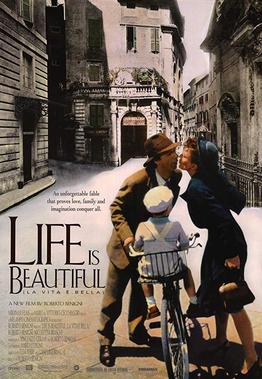Life is beautiful
(Vita è bella, La )

[Category]
Classical,Comedy,
Romance
[Language]
Italian
[Director]
Roberto Benigni
[Producer]
Gianluigi Braschi,
Elda Ferri
[Cast]
Roberto Benigni,
Nicoletta Braschi,
Giorgio Cantarini,
Giustino Durano,
[Story][Wikipedia Ref.]
The first half of the movie is a whimsical, romantic comedy and often slapstick. Guido (Roberto Benigni), a young Italian Jew, arrives in Arezzo where he sets up a bookstore. Guido is both funny and charismatic, especially when he romances Dora (Italian, but not Jewish; portrayed by Benigni's actual wife Nicoletta Braschi), whom he steals – at her engagement – from her rude and loud fiancé. Several years pass, in which Guido and Dora have a son, Joshua (written Giosué in the Italian version; portrayed by Giorgio Cantarini). In the film, Joshua is around five years old. However, both the beginning and ending of the film is narrated by an older Joshua.
In the second half, Guido, Guido's uncle Eliseo, and Joshua are taken to a concentration camp on Joshua's birthday. Dora demands to join her family and is permitted to do so. Guido hides Joshua from the Nazi guards and sneaks him food. In an attempt to keep up Joshua's spirits, Guido convinces him that the camp is just a game – a game in which the first person to get 1,000 points wins a tank. He tells Joshua that if you cry, complain that you want your mother, or complain that you are hungry, you lose points, while quiet boys who hide from the camp guards earn points. He convinces Joshua that the camp guards are mean because they want the tank for themselves and that all the other children are hiding in order to win the game. He puts off every attempt of Joshua ending the game and returning home by convincing him that they are in the lead for the tank. Despite being surrounded by rampant death and people and all their sicknesses, Joshua does not question this fiction both because of his father's convincing performance and his own innocence.
Guido maintains this story right until the end, when – in the chaos caused by the American advance drawing near – he tells his son to stay in a sweatbox until everybody has left, this being the final test before the tank is his. After trying to find Dora, Guido is caught, taken away, and is shot to death by a Nazi guard, but not before making his son laugh one last time by imitating the Nazi guard as if the two of them are marching around the camp together. Joshua manages to survive, and thinks he has won the game when an American tank arrives to liberate the camp, and he is reunited with his mother.
[Awards]
Grand Prize of the Jury at Cannes Film Festival in 1998
Academy Awards for Best Music, Original Dramatic Score and Best Foreign Language Film
Won 3 Oscars.
Around 52 wins
27 nominations
[Links]
http://www.imdb.com/title/tt0118799/
http://en.wikipedia.org/wiki/Life_Is_Beautiful
http://artsandfaith.com/t100/2005/entry.php?film=95

No comments:
Post a Comment